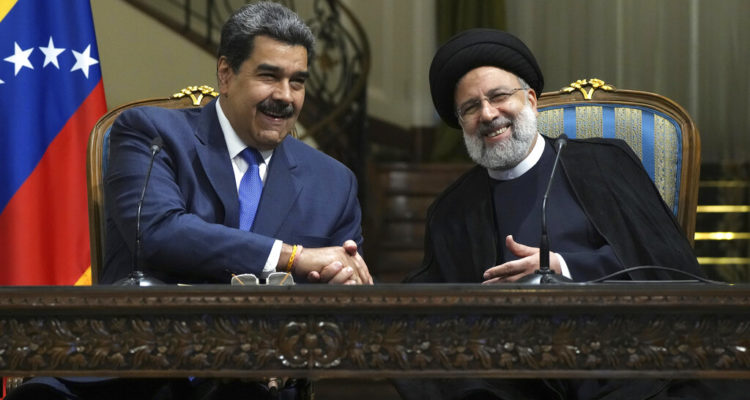Latin American countries are opportune places for Iranian covert intelligence operations, especially against the U.S.
By Majid Rafizadeh, The Gatestone Institute
One of the critical threats to the U.S .national peace and security is that the Iranian regime, while using Latin America as a sanctuary, has been increasing its presence and terror cells there.
As protests continue in Iran, the Iranian regime’s officials are in the process of obtaining passports and asylum from Latin American countries, particularly from Venezuela, at the doorstep of the United States.
According to a recent report:
“Western diplomatic sources told Iran International that the Islamic Republic has started negotiations with its Venezuelan allies to ensure they’d offer asylum to regime officials and their families should the situation worsen, and the possibility of a regime change increases…. a delegation of four high-ranking regime officials visited Venezuela in mid-October for negotiations to ensure that the Caracas government would grant asylum to high-ranking officials and their families in case ‘the unfortunate incident’ happens.”
Three flights a day are leaving Iran to Venezuela with “a considerable amount of cargo,” according to a source at Tehran’s Imam Khomeini Airport
“Initially, my colleagues and I thought these were embassy employees, though we noticed their car number plates didn’t belong to any embassy. We don’t know what they are transferring, and whether they are leaving the country with all the luggage or not. Because they won’t let us examine closely. We just know that in past weeks, every day there are three to four flights to Venezuela.”
Latin American countries are opportune places for Iranian covert intelligence operations, especially those targeting the United States. A CNN report from 2017 stated:
“One confidential intelligence document obtained by CNN links Venezuela’s new Vice President Tareck El Aissami to 173 Venezuelan passports and ID’s that were issued to individuals from the Middle East, including people connected to the terrorist group Hezbollah.”
These passports could be used for travel to North America or Europe.
Nathan Sales, former coordinator for counterterrorism at the US State Department, said:
“We’re concerned that [Venezuelan President] Maduro has extended safe harbor to a number of terrorist groups… [including] supporters and sympathizers of Hezbollah.”
The Iranian regime’s plan to expand its influence and presence in Latin America dates back to the mid-1980s, under the late Supreme Leader Ayatollah Ruhollah Khomeini, as part of the ruling mullahs’ core principle of exporting their extremist revolution to other countries. As Khomeini famously stated:
“We shall export our revolution to the whole world. Until the cry, ‘There is no god but Allah’ resounds over the whole world, there will be struggle.”
The regime’s key mission is even incorporated in Iran’s current constitution:
“The constitution provides the necessary basis for ensuring the continuation of the revolution at home and abroad. In particular, in the development of international relations, the constitution will strive with other Islamic and popular movements to prepare the way for the formation of a single world community.”
To spread its Islamist propaganda, the Iranian regime has set up Hispan TV, a Spanish-language television station. In Latin America, Iranian terror cells have grown. Al Mustafa International University and Iran’s terror proxy Hezbollah have played a key role in expanding the mullahs’ presence and ideology in the region.
According to “United Against Nuclear Iran” (UANI), Al-Mustafa International University is tasked with “training the next generation of Iran’s foreign Shi’a clerics, religious scholars, and missionaries….”
“It is estimated that Al-Mustafa has 40,000 foreign students enrolled at present, roughly half of whom are studying at campuses within Iran. Many Al-Mustafa graduates are selected by the Iranian regime to establish religious and cultural centers in their home countries, where they can then recruit students and inculcate loyalty to the Islamic Revolution among local populations.”
UANI adds:
“Al-Mustafa operates several branches in European countries, most notably the Islamic College of London. Graduates of Al-Mustafa such as Italian cleric Abbas DiPalma have gone on to form Iranian cultural centers in their home countries, such as the Imam Mahdi Center in Rome. Al-Mustafa has also dispatched Lebanese graduates as missionaries to Latin America, where they seek to create inroads with expat communities and proselytize among local populations.”
Evidence presented at court hearings linked Tehran to the bombings in Buenos Aires of the Israeli Embassy in 1992, and a Jewish community center there in 1994.
While the Biden administration continues to appease the Iranian regime, called by the U.S. Department of State the “world’s worst state sponsor of terrorism,” the Iranian mullahs are creating their single “umma” (nation) on the doorstep of the US: Latin America. The Iranian regime’s takeover of Latin America — the creation of terror cells, the access to Latin American passports, the rise of Iranian-trained imams and militants in Latin America, the increasing recruitment of radicals — is a potential existential threat to the United States.
Dr. Majid Rafizadeh is a business strategist and advisor, Harvard-educated scholar, political scientist, board member of Harvard International Review, and president of the International American Council on the Middle East. He has authored several books on Islam and US Foreign Policy. He can be reached at Dr.Rafizadeh@Post.Harvard.Edu





